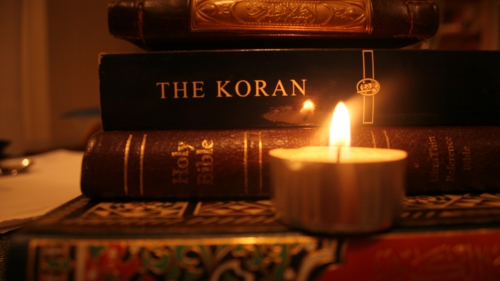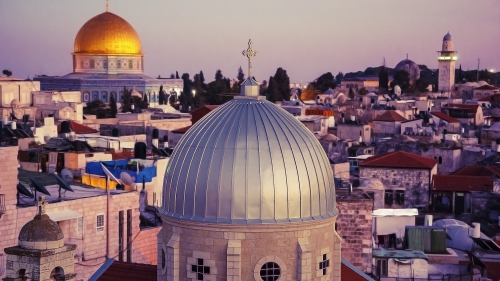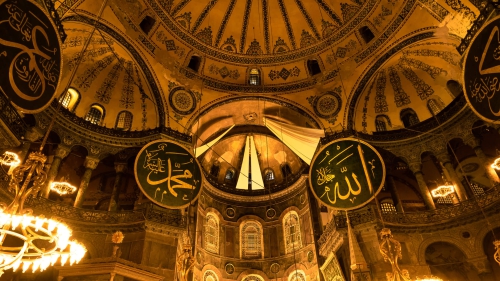The Religious Supporters and Opponents of Donald Trump

President Trump gained popularity among American Muslims nationally, according to the Institute for Social Policy and Understanding, an American Muslim survey organization. A recent poll published in October 2020, found that Muslim approval of Trump’s job performance has increased from 13% in 2018 and 16% in 2019 to 30% in 2020.
This may be why Trump has gone more or less silent on Muslims recently. In a barnstorming tour of the Midwest recently, the president spoke for nearly 90 minutes at a stop in Muskegon, Michigan, and never once mentioned Muslims.
However, although they can’t vote, American Muslim voters might be interested in the views of just over 3,000 Middle East and North African Arabs, across 18 countries who took part in a poll by YouGov and the Saudi-owned newspaper Arab News:
40% thought Joe Biden would be better for the region, while only 12% preferred President Trump, the rest were not sure or thought that neither of the two US presidential candidates will be good for the Middle East and North Africa
And an amazing 83% of Ultra-Orthodox Jews said they will vote for Donald Trump, compared to just 13% who said they’d support Joe Biden. This puts Ultra-Orthodox Jews ahead even of the 83% of white evangelical Americans who support Trump for reelection (62% strongly). Political surveys of only Ultra-Orthodox Jews are very rare.
But a survey of all Orthodox Jews (who are only 10% of the total American Jewish community) conducted in January 2020, provided to the Jewish Telegraphic Agency, found that 66% of Ultra-Orthodox voters voted for Trump in 2016, compared to just 32% of Modern Orthodox voters.
Four years ago, Trump won a bigger proportion of white evangelical votes than any Republican presidential candidate in history, and he is projected to win by an even greater proportion in this election; but because the number of white evangelicals have been in steady decline for the last 15 years, their impact will be less.
This decline in Evangelical churches membership is why many white evangelical voters are sympathetic to anti-gay and anti-foreigner white supremacist groups. Evangelical Lutherans dropped from 5.3 million in 1987 to 3.4 million now.
The Presbyterian Church USA had 3.2 million members in 1982, but now it is around 1.3 million. The Episcopal Church went from 3.4 million in the 1960s to 1.7 million now. Mainline faiths with seminary-educated ministers once drew lots of middle class public respect.
The Southern Baptist Convention, the nation’s largest Protestant denomination, said it had 14.8 million members in 2018, down by a million and a half since it peaked at 16.3 million in 2006.
The United Methodists, a more liberal Protestant denomination, fell from 11 million in 1969 to below 7 million today – while America’s population almost doubled.
In Pew Research Center telephone surveys conducted in 2018 and 2019, 65% of American adults describe themselves as Christians when asked about their religion, down 12 percentage points over the past decade.
Meanwhile, the religiously unaffiliated share of the population, consisting of people who describe their religious identity as atheist, agnostic or “nothing in particular,” now stands at 26%, up nine points from 17% in 2009.
59% of white Catholics voted for Trump in 2016 but the latest Washington Post/ABC News poll suggests that the big news with the Catholic vote this year may actually have to do with a shift in white Catholics’ votes toward Biden.
According to the poll, white Catholics now prefer Biden to President Trump by 51% to 45%. That’s a sea change from 2016, when they chose Trump over Hillary Clinton 61% to 37%.
But Trump supporters have risen from fewer than a quarter of Latino Catholics who voted for Trump in 2016, to one-third of them who back him now.
Only 8% of Black Protestants, the most Democratic religious group in the country, voted for Trump in 2016, now just 5% support him. And where 62% of non-evangelical whites — mainline Protestants — voted for him in 2016, now 59% prefer him to Biden; and suburban women account for most of that loss of support.
The decline of churchgoing Christians in America may undercut the Republican Party, which depends on white evangelicals as the heart of its base. In contrast, unchurched Americans tend to be compassionate progressives who have become more like Jews who are traditionally the most loyal white voters and contributors in the Democratic Party.
A Garin-Hart-Yang online survey of 810 Jewish voters nationally conducted from September 2 to 7, 2020, found that 67% of Jewish voters disapprove of President Trump’s job performance; and 70% of Jewish voters view Joe Biden in favorable terms, more than 20% higher than the American electorate in general.
Two-thirds of Jewish voters say they will vote for Joe Biden. Only 30% who will vote for President Trump.
Three-quarters of Jewish women say they favor Biden.
Jewish voters have a much more positive views of the Black Lives Matter (BLM) movement than the overall electorate (a CNN national survey showed BLM’s image as 51% favorable and 38% unfavorable), while non-Orthodox Jews have positive feelings toward BLM by better than two-to-one. Even two-fifths of Jewish Republicans have positive impressions of BLM.
Allen S. Maller is an ordained Reform Rabbi who retired in 2006 after 39 years as the Rabbi of Temple Akiba in Culver City, California. His web site is: www.rabbimaller.com. He blogs on the Times of Israel. Rabbi Maller has published 400+ articles in some two dozen different Christian, Jewish, and Muslim magazines and web sites. His two recent books are: "Judaism and Islam as Synergistic Monotheisms’, and "Which Religion Is Right For You? A 21st Century Kuzari".
Topics: American Jews, American Muslims, Donald Trump, Interfaith, Us Elections 2020
Views:2417
Related Suggestions

















